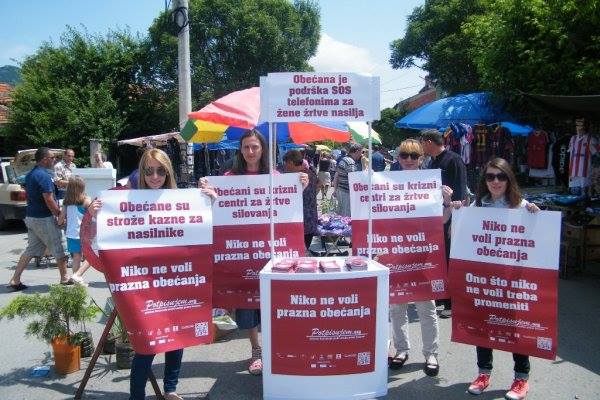Research shows that every second woman in Serbia suffers at least one form of violence in her lifetime. What is the legal framework prohibiting violence against women in Serbia? Why don’t victims leave their abusers? What is the activism of women’s organisations? An overview.
The prevalence of violence against women in Serbia
Violence against women in Serbia is an everyday occurrence and issue which is widely tolerated, covered up, normalized and neglected. A strong influence of patterns of patriarchal culture and traditional gender roles which are deeply engrained in Balkan mentality takes place even today under the veil of a seemingly modern society of 21st century. In the Balkans, male violence is widely accepted under the influence of “macho” culture which interprets aggression as a demonstration of power and masculinity and which results in every second woman suffering some form of violence during her lifetime. This culture also contributes to several dozen women being murdered by their husbands and partners each year and perpetrators being insufficiently punished with low fines and light prison sentences.
This was shown in research conducted in 2010 and published in the document by the Administration for Gender Equality RS titled “Mapping domestic violence against women in Central Serbia”. This research shows that 54.2% of women (I.e, every second woman) in Serbia suffer at least one of the forms of violence in their lifetime (physical, psychological, economic, sexual). Furthermore, the data about femicide, as gender-based murder of women committed by men, is regularly recorded and updated on the website of the group of women’s organisations called “The Women Against Violence Network”, which has noted in the 6-month period, starting from January 1st to June 30th, 21 women who have been murdered by partners and family members, whilst in 2012, 2013 and 2014 the numbers were 34, 43 and 27 respectively. The murders were mostly committed by their current or ex husbands or partners, and less frequently by their sons, relatives or sons-in-law.
There are multiple reasons why proper care for the victim and punishment for the perpetrator are limited:
- An environment which discourages women from reporting and openly speaking about violence
- High tolerance culturally for violence
- Ignorance about legislation concerning the problem of violence against women
- Police avoiding responsibility
- Avoidance of the defined protocol
- Long duration of criminal proceedings
Illustrative examples can be found in the Serbian daily press:
In October 2015, the Večernje novosti daily wrote that a man from the town of Petrovac na Mlavi, aged 51, stabbed to his wife death (she was 49 and she had left him a few months ago). He tried to justify his crime saying that she had published information about her new relationships on Facebook, which deeply disturbed him, and finally, when he saw her from his car in front of the elementary school where she worked as a teacher, “he saw red” because she showed him the middle finger. He then approached her and stabbed her to death with a knife in front of her pupils. Two days before the murder, his spouse had alerted the police when he’d sent her an SMS threatening to kill her. Initally, the police response was that he was only required to attend one hearing and he wasn’t held in custody although the police did remove the weapons he had in his house. Now he is being accused of murder in the first degree and he could be sentenced to a maximum of 20 years in prison. His accountability during the crime is also being examined.
The public TV service RTS reports that in Smederevo in March 2014, a 63 year-old man had struck his wife with an axe in her sleep and then stabbed her to death. Before she went to bed, she told him she didn’t want to live with him anymore. That crime was qualified as second-degree murder (which was a lesser charge than the previous murder in the first degree qualification), and he was sentenced to 12 years of prison. While explaining the verdict, the judge said that the accused could not be held accountable for the crime because “he was afraid that his wife would leave him, and he was also annoyed with her snoring”. Thus, a cynical conclusion can be made that it doesn’t take much for an average Serbian man to “lose control” and “see red”, and that in Serbia being annoyed at someone because of their snoring and showing the middle finger can be an extenuating circumstance for murder, as demonstrated publicly by the judicial system.
These facts show us that male violence against women in Serbia is a systematic syndrome and quite frequent occurrence which is neither efficiently prevented nor followed by adequate protection and support for the victim.
Normative framework prohibiting violence against women in Serbia
The problem of violence against women and domestic violence in Serbia is regulated by strategic documents and laws, among which the “Law on Ratification of the European Council’s Convention on preventing and combating violence against women and domestic violence”, adopted in 2013 is of great significance. Full implementation of the Convention adopted in Istanbul in 2011 is yet to be done.
The rights of the victim are precisely defined by the law – the victim has the right to be protected by relevant state authorities. Protocol implies that once the violence has been reported, the police are obliged to gather all accessible information about the perpetrator, estimate the security risk, come to the scene, gather information about the particular case and take care of the victim. Besides the police, the victim has the right to contact social work centers, health institutions and judicial bodies in search for help.
At the moment, according to the new Family Act adopted in 2005, victims of violence can exercise their rights in civil proceedings by filing lawsuits to determine protection measures: the court’s restraining order protects the victims from further harassment and requires the eviction of the perpetrator from the household instead of relocation of victims. However, in reality, these proceedings often last for nearly a year despite of stipulation of urgency (scheduling the first hearing 8 days after lawsuit has been filed), and courts seldom decide to remove the perpetrator from the home.
The police often avoid their own responsibility and advise the couple to make up and “try not to destroy the family”, leaving them together, which discourages the victim to seek help and encourages the abuser to continue with his behavior. That’s the reason why in October 2015, the Autonomous Women’s Center (a women’s non-governmental organisation), submitted a request for a new draft of Law on Police in which police officers would be granted the authority to remove the perpetrator from the address of residence for 14 days. During those 14 days the victim would get free psychological and legal assistance. This is modeled after the Austrian solution created in 1996. However, the Ministry of Internal Affairs of Serbia proposes only amendments to the Criminal Procedure Code in which the removal of the abuser from the household would be conducted solely after the commencement of criminal proceedings.
This is not an adequate solution because the police lose the obligation and responsibility for taking urgent protection measures and the victim is deprived of assistance. This is due to the fact that in only 10% of reported cases of violence are criminal proceedings initiated – it takes several weeks, months, sometimes even years before the criminal charge is made. The Ministry argues that Serbia, unlike Austria and other EU member states, doesn’t have nearly enough resources to provide accommodation for perpetrators after their removal from the household, and that the removal of a person without their consent would be unconstitutional and illegal. The Autonomous Women’s Center had refused to accept this argument from the Ministry of internal Affairs, and responded that the Ministry had completely misinterpreted the Austrian model and that it had misinformed the public. First of all, it is not true that these urgent protection measures would be unconstitutional, because:
- In the Constitution of the Republic of Serbia it is clearly stated that “the use of property can be restricted by the Law”.
- The Family code, as a protective measure allows “an order for eviction from the family apartment or house, regardless of ownership or lease of real estate.”
- The Council of Europe Convention states that in situations of imminent danger, the parties will undertake necessary legislative or other measures to ensure that competent authorities have the authority to issue an order to the offender to leave the place of residence of the victim for a sufficient period of time, in order to prohibit the offender to contact the victim.
Therefore, the proposal for the introduction of urgent protection measures as a police authority in the new Police Act is fully in line with the Constitution of the Republic of Serbia and the Council of Europe Convention. It is also not the case that Austria provides accommodation to the evicted offenders or that the state provides specific support to them in any way, so there is no reason for Serbia to do it either. Police officers are only obliged to provide them with information aboutaffordable accommodation. Besides, in every big town in Serbia, there are shelters for homeless people, so the accommodation for the perpetrators should not be an obstacle in the implementation of protective measures. This initiative and negotiation with the Ministry of Internal Affairs is in process and it remains to be seen whether Serbia will soon be ready to adopt the protocols that have been already in use across the European Union for 20 years.
When it comes to moving out and taking care of the victim, there are 13 safe houses and shelters which are mostly ran by centers for social work. However, rural areas and smaller towns are problematic because there are no shelters nearby. Women in smaller communities are also forced to tolerate and put up with violence because of the pressure of the environment where everyone knows each other in person and where it is hard to stay anonymous while dealing with this kind of issue. Therefore we can conclude that the real frequency of violence against women in Serbia is likely to be considerably higher than the recorded figures.
Why don’t victims leave their abusers?
An important issue is losing sight of the reasons why victims often stay in partnership with abusers despite of continuous violence. This misunderstanding leads to a shifting away of the the responsibility from the abuser and redirecting it to the victim, with the explanation that the victim is “obviously asking for it, since she keeps coming back to him”. This way of thinking is completely wrong because there is no consideration that every case is determined by specific psychological, economic and cultural factors which affect reasoning, decision making and dealing with the situation. The decision to stay in partnership with the abuser is often previously conditioned by following things:
- Existence of children and a wish to keep the family together at any cost
- Financial dependence on the partner
- Fear of the abuser’s reaction after reporting violence
- Hope and belief that the partner will change
- Feeling of shame and believing that she earned what is happening to her
- Fear of loneliness and a belief that it is hard to find a new partner
- Ignorance about her own rights
- Distrust in power and efficiency of the system which is supposed to provide protection
- Lack of support of other members of the family who are opposed to the splitting of that couple
Despite of all the reasons why women tolerate abuse, society must raise awareness that the victim can in no circumstances be blamed for suffering violence, because no form of violence can ever be justified and it is absolutely intolerable as a means of problem-solving.
Activism of women’s organisations
Among organisations which actively work towards ending domestic violence, the above-mentioned Autonomous Women’s Center stands out. It provides legal advice, psychological support, preventive and educational activities for women, client representation, publishing and cooperation with other women’s organisations. Its biggest contribution to battling violence against women is launching the “I sign” campaign, which lasted from November 2013 until November 2014. The aim of this campaign was full implementation of “European Council’s Convention on preventing and combating violence against women and domestic violence”. Thirty different women’s organisations clustered in “The Women Against Violence Network” participated, and the focus was raising citizens’ awareness about the existence and harmfulness of violence, as well as responsibilities Serbia took after ratifying the Convention on October 31st in 2013.
Main issues of the campaign were:
- Urgent protection measures for victims of violence
- Protection from stalking
- Stricter penalties for perpetrators
- SOS telephone numbers for the support of women who are victims of violence
- Crisis centers for victims of sexual violence and rape
The current initiative of Autonomous Women’s Center is the amendment of the Police Act, which was already mentioned above.

The AWC has also created an app for mobile telephones called “Bezbedna” (“Safe”) which can be downloaded from Google play store. When using the app, only one click can instantly and automatically send SOS text messages with the GPS location of the user to previously selected contacts. It is also possible to locate the nearest social work centers, police, ambulance and other services. There is also a Bluetooth bracelet that can, after previous “pairing” with the phone, send SOS texts with current location, with only one click of a button.


Nevertheless, despite of all efforts of NGOs, Serbia must take the responsibility for implementation of fundamental changes in the system and provide better functionality in the judiciary system, improve organisation and cooperation among the institutions responsible for providing security for women, and also work on raising social awareness of the harmfulness and destructiveness of violence, which is an exhausting but necessary process in order to create an egalitarian society. Among all issues that exist in Serbia, the rights of women must be ranked among the priority topics. The fact that this topic is very often neglected with an excuse that there are more urgent issues is utterly devastating, given the fact that we are talking about the lives of the 50% of population.
Istraživanja pokazuju da svaka druga žena u Srbiji tokom svog života pretrpi bar jedan od oblika nasilja. Kako izgleda srpski pravni okvir koji zabranjuje nasilje nad ženama? Zašto žrtve ne ostavljaju nasilnike? Kakav je aktivizam ženskih organizacija?
Rasprostranjenost nasilja nad ženama na području Srbije
Nasilje nad ženama je u Srbiji svakodnevna pojava koja se u velikoj meri toleriše, zataškava, normalizuje i zanemaruje. Snažan uticaj obrazaca patrijarhalne kulture i tradicionalnih rodnih uloga koji su duboko ukorenjeni u balkanskom mentalitetu i danas se ispoljava pod velom prividno modernog društva 21. veka. Muško nasilje je na Balkanu široko prihvaćeno pod uticajem „mačo“ kulture koja agresiju interpretira kao demonstraciju muškosti i moći, što dovodi do toga da svaka druga žena kao pripadnica ranjivije grupe tokom svog života doživi neki od oblika nasilja, da svake godine identifikujemo nekoliko desetina žena koje ubiju muški partneri ili članovi porodice, i do toga da se nasilnici nedovoljno strogo sankcionišu blagim novčanim i zatvorskim kaznama.
Dokaz za to nalazimo u istraživanju iz 2010. godine, koje je objavljeno u dokumentu Uprave za rodnu ravnopravnost RS „Mapiranje porodičnog nasilja prema ženama u centralnoj Srbiji“. Ono pokazuje da 54,2%, tj svaka druga žena u Srbiji tokom života doživi neki od oblika nasilja (fizičko, psihičko, seksualno, ekonomsko). Takođe, podaci o femicidu, kao rodno zasnovanom ubistvu žena koje počine muškarci, prikupljaju se i redovno ažuriraju na internet stranici grupe ženskih organizacija “Mreža Žene protiv nasilja“, koje su za šestomesečni period od 1. januara do 30. juna 2015. godine zabeležile 21 slučaj ubistva žena u porodično-partnerskom odnosu, dok je u 2012., 2013. i 2014. godini zabeleženo 34, 43, odnosno 27 slučajeva. Ubistva su najčešće počinili njihovi sadašnji i bivši supruzi ili partneri, a u manjem broju sinovi, zetovi i rođaci.
Razlozi zbog kojih je u Srbiji uspešno zbrinjavanje žrtve i kažnjavanje počinioca nasilja ograničeno višestruki su:
- okolina koja obeshrabruje žene da javno govore o nasilju i prijavljuju ga
- visok stepen tolerancije prema nasilju u kulturi
- nepoznavanje zakonske regulative u vezi sa problemom nasilja nad ženama
- izbegavanje odgovornosti policije
- nepoštovanje definisanih protokola
- predugo trajanje krivičnog postupka.
Ilustrativni primeri se mogu naći u dnevnoj srpskoj štampi:
U oktobru 2015. Večernje novosti prenose vest da je muškarac iz Petrovca na Mlavi, star 51 godinu nožem nasmrt izbo suprugu (49) koja ga je nekoliko meseci ranije napustila. Kao opravdanje za svoj zločin navodi da je ona na Fejsbuku objavljivala podatke o svojim novim emotivnim vezama što ga je potresalo, a kada ju je video iz automobila ispred osnovne škole u kojoj je radila kao učiteljica, „pao mu je mrak na oči“ jer mu je pokazala srednji prst. Tada joj je prišao i izbo nožem naočigled đaka. Dva dana pre ubistva, supruga je prijavila policiji da joj je dotični poslao SMS poruku u kojoj joj preti ubistvom. On je tada samo salušan, nije zadržan u pritvoru i oduzeto mu je oružje koje je držao u kući. Nakon svega ovoga, on se tereti za obično ubistvo i može da dobije kaznu od najviše 20 godina zatvora. Takođe se ispituje njegova uračunljivost za vreme zločina.
RTS izveštava da je u Smederevu u martu 2014, muškarac star 63 godine udario sekirom a potom nasmrt izbo nožem suprugu dok je spavala. Pre nego što je otišla na spavanje, rekla mu je da ne želi više da živi sa njim. Ubistvo je iz teškog prekvalifikovano u obično ubistvo i u oktobru 2015. je osuđen na 12 godina zatvora. U obrazloženju presude, sudija je rekao da je utvrđeno da je okrivljeni bio neuračunljiv jer se „bojao da će ga supruga napustiti, a takođe ga je nerviralo njeno hrkanje“. Dakle, cinično bi se moglo zaključiti da je prosečnom srpskom muškarcu vrlo malo potrebno da „izgubi kontrolu nad sobom“ i da mu „padne mrak na oči“ i da u Srbiji iritacija zbog nečijeg hrkanja i pokazivanja srednjeg prsta predstavlja olakšavajuću okolnost kada se počini ubistvo, što nam pravosuđe kroz svoj rad javno demonstrira.
Ove činjenice i primeri ukazuju na to da je nasilje muškaraca nad ženama sistemski sindrom, ozbiljan problem i izuzetno učestala pojava koja nije regulisana efikasnim merama prevencije niti praćena adekvatnom zaštitom i podrškom žrtve.
Normativni okvir zabrane nasilja nad ženama
U Srbiji je problem nasilja nad ženama i porodičnog nasilja regulisan strateškim dokumentima i zakonima, među kojima se ističu:
– Nacionalna strategija za sprečavanje i suzbijanje nasilja nad ženama u porodici i u partnerskim odnosima (2011.-2015.)
– Strategija o prevenciji i zaštiti od diskriminacije (2013.-2018.)
– Krivični zakonik Srbije (2005. sa poslednjim izmenama iz 2014.)
– Porodični zakon (2005. sa poslednjim izmenama iz 2015.)
– Zakon o ravnopravnosti polova (2009.)
– Zakon o zabrani diskriminacije (2009.)
– Zakon o potvrđivanju Konvencije Saveta Evrope o sprečavanju i borbi nasilja nad ženama i nasilja u porodici (2013.) – on je od posebne važnosti jer tek treba da se radi na obezbeđivanju pune primene ove Konvencije koja je doneta u Istanbulu 2011.
Pravo žrtve je zvanično definisano zakonom – ona ima pravo da bude zaštićena i obrati se nadležnim državnim organima. Protokol podrazumeva da po prijavi nasilja policija prikupi sve dostupne informacije o nasilniku, utvrdi faktor bezbednosnog rizika, dođe na lice mesta, prikupi informacije o konkretnom slučaju i zbrine žrtvu. Žrtva ima pravo da se, osim policiji obrati i centru za socijalni rad, zdravstvenoj ustanovi i pravosudnim organima.
Trenutno, po novom Porodičnom zakonu iz 2005. žrtve nasilja mogu svoja prava ostvariti i u parničnom postupku podnošenjem tužbe za određivanje mera zaštite – sudske zabrane prilaska žrtvi, mestu stanovanja, daljeg uznemiravanja kao i iseljenja nasilnika iz domaćinstva umesto izmeštanja žrtve. Međutim, u praksi ovi postupci traju čak i do godinu dana iako je propisana hitnost u postupanju (zakazivanje prvog ročišta nakon osam dana od dana podnošenja tužbe), a sudovi izuzetno retko donose odluku o iseljavanju nasilnika.
Policija takođe vrlo često izbegava odgovornost i obično savetuje par da se pomiri i „ne rastura porodicu“ i ostavlja ih zajedno, što samo obeshrabruje žrtvu da potraži pomoć, a nasilnika ohrabruje da nastavi sa svojim ponašanjem. Zbog toga je Autonomni ženski centar, ženska nevladina organizacija, u oktobru 2015. podnela zahtev za formiranje novog predloga Zakona o policiji u kom bi policijskim službenicima bilo dodeljeno ovlašćenje da udalje nasilnika sa adrese stanovanja na 14 dana tokom kojih bi žrtva dobila besplatnu psihološku i pravnu pomoć, po uzoru na austrijski model koji postoji još od 1996.
Međutim, Ministarstvo unutrašnjih poslova Srbije trenutno predlaže samo izmene Zakonika o krivičnom postupku po kom bi se udaljavanje nasilnika iz domaćinstva sprovelo tek nakon pokretanja krivičnog postupka. To nije adekvatno rešenje jer se tako policija oslobađa odgovornosti i obaveze sprovođenja hitnih mera zaštite a žrtve uskraćuju za pomoć, s obzirom na to da se samo 10% prijavljenih slučajeva nasilja završi pokretanjem krivičnog postupka zato što je potrebno da prođe nekoliko nedelja, meseci pa čak i godina pre nego što se sastavi krivična prijava. Kao argument Ministarstvo navodi da Srbija, za razliku od Austrije i drugih zemalja EU nema ni približno dovoljno sredstava za obezbeđivanje smeštaja u kom bi nasilnici boravili nakon izmeštanja, kao i da bi iseljavanje čoveka iz stana bez njegove saglasnosti bilo protivustavno i protivzakonito. Autonomni ženski centar je nakon ove izjave Ministarstvu poslao demant u kom ga opominje da potpuno pogrešno tumači austrijski model i da javnosti pruža netačne informacije. Najpre, netačno je da bi ove hitne mere zaštite bile protivustavne jer:
- U Ustavu Republike Srbije se navodi da se „Zakonom može ograničiti način korišćenja imovine“
- Porodični zakon kao meru zaštite propisuje „izdavanje naloga za iseljenje iz porodičnog stana ili kuće, bez obzira na pravo svojine ili zakup nepokretnosti“.
- Konvencija Saveta Evrope navodi da „u situacijama neposredne opasnosti, strane se obavezuju da preduzmu neophodne zakonodavne ili druge mere i obezbede da nadležni organi imaju ovlašćenje da izdaju nalog učiniocu nasilja u porodici da napusti mesto stanovanja žrtve ili ugroženog lica u dovoljnom vremenskom periodu i da zabrane učiniocu da povredi boravište, odnosno stupi u kontakt sa žrtvom ili ugroženim licem.“
Dakle, predlog AŽC-a za uvođenje hitnih mera zaštite kao policijskog ovlašćenja u novi Zakon o policiji je sasvim u skladu sa Ustavom RS i Konvencijom Saveta Evrope. Takođe, netačno je da Austrija nasilnicima finansira smeštaj i da se država posebno brine o njima, pa nema razloga da to radi ni Srbija. Policijski službenici su u obavezi jedino da učiniocu nasilja uruče adresar najjeftinijeg smeštaja. Pritom, Srbija u svakom većem gradu ima i prihvatilišta za lica u beskućništvu, tako da smeštaj za nasilnike ne bi trebalo da predstavlja bilo kakvu prepreku u implementaciji hitnih mera zaštite. Ova inicijativa i pregovor sa Ministarstvom unutrašnjih poslova je aktuelnost i ostaje da vidimo da li će Srbija uskoro biti spremna za usvajanje protokola koji se u Evropskoj Uniji već 20 godina uspešno primenjuju.
Više o austrijskom modelu i demantu pročitati na:
http://www.womenngo.org.rs/publikacije-dp/Austrijski%20model.pdf
Kada je reč o izmeštanju i zbrinjavanju žrtve, u Srbiji je u većim gradovima izgrađeno ukupno 13 sigurnih kuća/prihvatnih centara/savetovališta kojima uglavnom rukovode centri za socijalni rad. Međutim, poseban problem predstavljaju ruralna područja i manja mesta u čijoj blizini nema prihvatilišta. Žene su u manjim mestima takođe primorane da trpe i tolerišu nasilje zbog pritiska i osuđivanja okoline u kojoj se većina ljudi poznaje i u kojoj je teško zadržati anonimnost pri rešavanju ovakvog problema, tako da se može zaključiti da stvarna učestalost nasilja nad ženama u Srbiji značajno premašuje onu koja je evidentirana.
Zašto žrtve ostaju sa nasilnikom?
Izuzetno značajna tema je nerazumevanje razloga zbog kojih žrtve često ostaju sa zlostavljačem uprkos kontinuiranom nasilju. Ovo nerazumevanje dovodi do toga da se odgovornost i krivica za ono što se dešava prebacuje na žrtve a istovremeno skida sa nasilnika, sa obrazloženjem da „one očigledno svesno tolerišu i pristaju na nasilje čim se vraćaju zlostavljaču“. Ovakav način razmišljanja je potpuno pogrešan jer se ne uzima u obzir da je svaki pojedinačni slučaj određen specifičnim psihološkim, ekonomskim i kulturološkim faktorima koji istovremeno utiču na rasuđivanje, odlučivanje i nošenje sa situacijom. Odluka žene da ostane u partnerstvu sa nasilnikom najčešće je uslovljena:
- postojanjem dece i željom za očuvanjem porodice na okupu po svaku cenu
- finansijskom zavisnošću od partnera
- strahom od reakcije zlostavljača ako prijavi nasilje
- verovanjem i nadom da će se partner promeniti
- osećanjem sramote i mišljenjem da je zaslužila to što joj se događa
- strahom od samoće i ubeđenjem da je teško naći drugog partnera
- nepoznavanjem sopstvenih prava
- nepoverenjem u efikasnost i moć sistema koji je dužan da pruži zaštitu
- nepodržavanjem od strane drugih članova porodice koji se protive okončanju tog braka ili veze.
Bez obzira na sve razloge zbog kojih žene tolerišu zlostavljanje, u društvu se mora podići svest o tome da se žrtva ne sme ni u kom slučaju kriviti za nasilje koje se vrši nad njom jer je bilo koji oblik nasilja neopravdan i apsolutno nedopustiv kao način rešavanja problema i konflikata.
Aktivizam ženskih organizacija
Među organizacijama koje aktivno učestvuju u suzbijanju nasilja nad ženama izdvaja se gorepomenuti Autonomni ženski centar koji se bavi pravnim konsultovanjem, pružanjem psihološke pomoći, preventivno-edukativnim aktivnostima za žene, zastupanjem klijentkinja, izdavaštvom, saradnjom sa drugim ženskim organizacijama, itd. Njegov veliki doprinos u borbi protiv nasilja nad ženama je pokretanje kampanje „Potpisujem“, koja je trajala od novembra 2013. do novembra 2014. godine. Cilj ove kampanje bio je puna primena Konvencije Saveta Evrope o sprečavanju i borbi protiv nasilja nad ženama i nasilja u porodici. U njoj je učestvovalo 30 različitih ženskih organizacija iz čitave Srbije koje su grupisane u Mrežu Žena protiv nasilja, a u fokusu je bilo podizanje svesti građanki i građana o postojanju i ozbiljnosti nasilja, kao i o obavezama koje je država preuzela ratifikacijom Konvencije 31. oktobra 2013. Glavne stavke kampanje bile su:
-Hitne mere zaštite za žrtve nasilja
-Zaštita od proganjanja
-Strože kazne za počinioce nasilja
-SOS telefoni za podršku ženama sa iskustvom nasilja
-Krizni centri za žrtve seksualnog nasilja i silovanja
Trenutno je aktuelna inicijativa AŽC-a za izmenu Zakona o policiji, o čemu je gore već bilo reči.
AŽC je takođe kreirao aplikaciju „Bezbedna“ za mobilne telefone koja se može skinuti sa Google play store-a. Pomoću nje se jednim klikom automatski mogu poslati SOS poruke odabranim kontaktima, zajedno sa GPS lokacijom korisnice. Takođe se mogu locirati najbliži centri za socijalni rad, policija, hitna pomoć i druge službe. Osim aplikacije, napravljena je i Bluetooth narukvica pomoću koje se, nakon prethodnog „uparivanja“ sa telefonom, jednim pritiskom na dugme takođe mogu poslati SOS poruke sa trenutnom lokacijom.
No, bez obzira na napore nevladinih organizacija, Srbija mora preuzeti na sebe odgovornost za sprovođenje temeljnih promena u sistemu i obezbediti bolju funkcionalnost u pravosuđu, unaprediti organizaciju i saradnju institucija koje su odgovorne za zaštitu bezbednosti žena, a takođe raditi i na društvenom osvešćivanju o štetnosti i destruktivnosti nasilja što predstavlja mukotrpan ali neophodan proces u funkciji stvaranja egalitarnog društva. Među svim problemima koji postoje u Srbiji prava žena se moraju svrstati među prioritetne teme, jer je činjenica da se ona vrlo često potiskuju u drugi plan sa obrazloženjem da postoje hitniji poslovi krajnje poražavajuća, imajući u vidu da govorimo o životima polovine celokupne populacije.



![The Flemish Green Party – do they practice gender mainstreaming? – De groene partij van Vlaanderen – Is gendermainstreaming de norm? [EN/NL]](https://www.youngfeminist.eu/wp-content/uploads/2016/09/logo-150x150.jpg)

[…] violence against women in Poland, Latvia and in Serbia […]